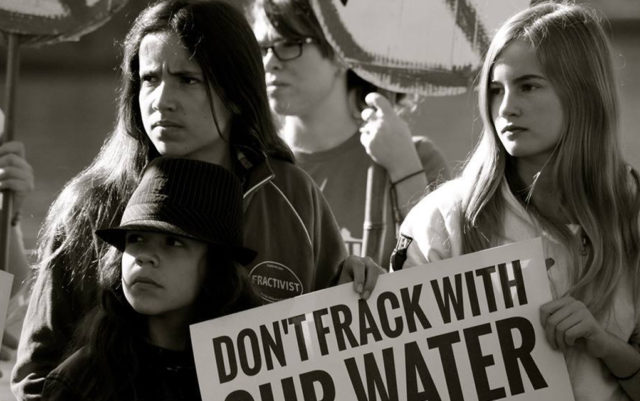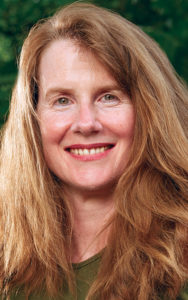
When Hurricane Katrina struck in 2005, Mary Wood, law professor and faculty director of the Environmental and Natural Resources (ENR) Law Center at the University of Oregon, was expecting her third son. With a long career both practicing and teaching environmental and natural resources law, climate change was not a new concept for Wood. But in the wake of Katrina’s devastation, she began to see the connections between the future of the environment and the future of humanity more clearly.
“Climate [change] just hit me as this horrendous new reality that my child would be born into,” she says. “Every young person is facing an unthinkable future if we don’t get this problem under control.”
Wood has since become nationally recognized for her scholarship on the public trust doctrine, or the principle that public natural resources must be maintained as a lasting endowment for the public’s use. Recognizing the failure of statutory law to adequately deal with major environmental problems, Wood uses the public trust doctrine to compel government action on climate change. Her 2013 book, Nature’s Trust: Environmental Law for a New Ecological Age, inspired Atmospheric Trust Litigation (ATL), the legal approach now being used in cases and petitions brought by the organization Our Children’s Trust (OCT) on behalf of children and youth throughout the United States and other countries.
“Atmospheric Trust Litigation is an orchestrated global litigation effort to force governments to reduce carbon dioxide emissions before the planet goes over an irrevocable tipping point,” Wood says. “The claim says that the federal government is a trustee of our atmosphere, just as it is a trustee of public lands and wildlife and water. And as trustee, it has the fiduciary duty to the youth beneficiaries to protect what it holds in trusts so that the climate system will continue to support life in this country.”
A landmark case, Juliana et al. v. United States of America et al., was filed in 2015 in the U.S. District Court of Oregon on behalf of 21 youth plaintiffs from around the country against the Obama Administration over its inaction to effectively combat climate change. On Nov. 10, Federal Judge Ann Aiken rejected all arguments from the federal government and the fossil fuel industry to dismiss the case. The youth plaintiffs are now preparing for trial.
By allowing greenhouse gas emissions to hinder future generations’ right to natural resources, Wood maintains that the U.S. government is breaching its constitutional duty to national and international youth. While not involved as a lawyer in the litigation, Wood assesses the ATL campaign from an academic perspective, calling the Juliana case “the biggest case on the planet,” a phrase that has also been adopted by Julia Olsen, executive director and chief legal counsel of OCT.
In July 2014, seven young people filed a different appeal in the Denver District Court in hopes of overturning a Colorado Oil and Gas Conservation Commission (COGCC) decision that denied the youth’s petition for stronger fracking regulations in November 2013. In December 2014, the court ruled in favor of the plaintiffs and ordered the case to proceed. However, Denver District Court Judge J. Eric Elliff affirmed COGCC’s order to deny the fracking petition in February 2016. The youth plaintiffs appealed Judge Elliff’s decision in April. Olsen says that OCT finished briefing the appeal in the Colorado case and that all legal arguments were submitted to the court the first week in November.
“Now we’re waiting to see if we will have an oral argument,” Olsen says. “We have requested the court set an oral argument. The legal arguments in writing are submitted so the plaintiffs are waiting to set a hearing, which they’re hopeful [the court] will, so that we can present the arguments at the hearing and so that Coloradans can come out to that hearing and support the youth.”
Wood emphasizes the danger of governments not recognizing the consequences of their actions, or inactions, until it’s too late. Companies are pushing into communities promising riches but irrevocably damaging natural resources, she says. As an academic but also as a mother, Wood is concerned about water supplies contaminated by fracking and the subsequent lasting harm to local communities. That’s why Wood stresses the importance of the national case and the fight for the future that it represents.

However, the legal case is only one avenue. It’s going to take citizens rising up on every front to save communities and halt oil and gas companies’ exploits, she says. Still, a court decision favoring youth in the federal case would represent a “historic turning point.”
“This may be the biggest case on the planet but the battleground is all across the globe at this point,” Wood says. “I think citizens globally realize that and that’s why they’re rising up in all sorts of forms. In the Colorado legislature, in the Oregon courts, on the land at Standing Rock. They’re all connected.
“If this case succeeds, then the federal government is going to have to completely overhaul its fossil fuel policy, such that it phases out fossil fuel altogether. Because we simply can’t continue using fossil fuels and still hope to have a habitable country at century’s end,” she says.
Ultimately, the youth plaintiffs seek a court-ordered, enforceable plan to achieve deep cuts in greenhouse gas emissions, adequate to avert looming climate tipping points. Wood drives home the point that citizens across communities in Colorado and beyond have to work to provide the backing for the relief that is sought in this federal case. She says it is important to view local environmental efforts as integral and part of a global effort. But she also has words of encouragement for local activists in Colorado who suffered defeat by not getting the local control and setback initiatives on the ballot this fall.
“No major movement has grown without multiple repeated defeats along the way,” she says. “If you look at the major movements of our time, every defeat resulted in a greater victory. If the people in Colorado had passed these initiatives years ago, they wouldn’t have gone through the pain and work of building a community-wide movement. Coloradans have been pioneers in this movement. The people are more powerful now because the situation is so dangerous for young people.”
As Wood says, the extraordinary danger young people face from this climate emergency is becoming widely apparent, and it is creating unprecedented power in the people.
Correction: The subhead of this article has been updated to reflect the legal arguments made by Our Children’s Trust. We apologize for any inconvenience.














